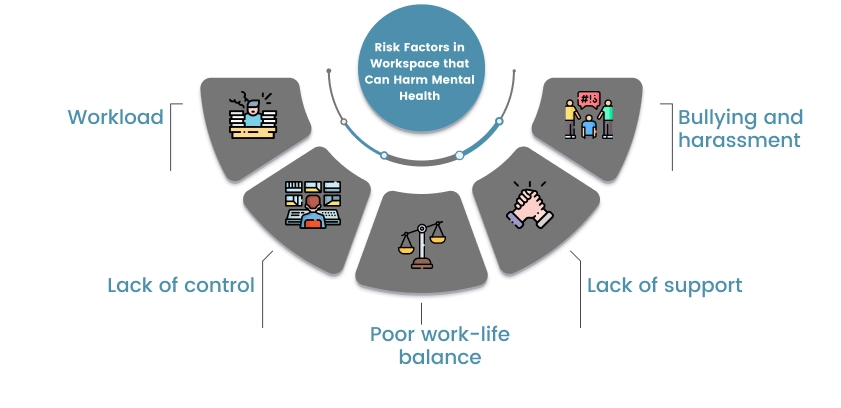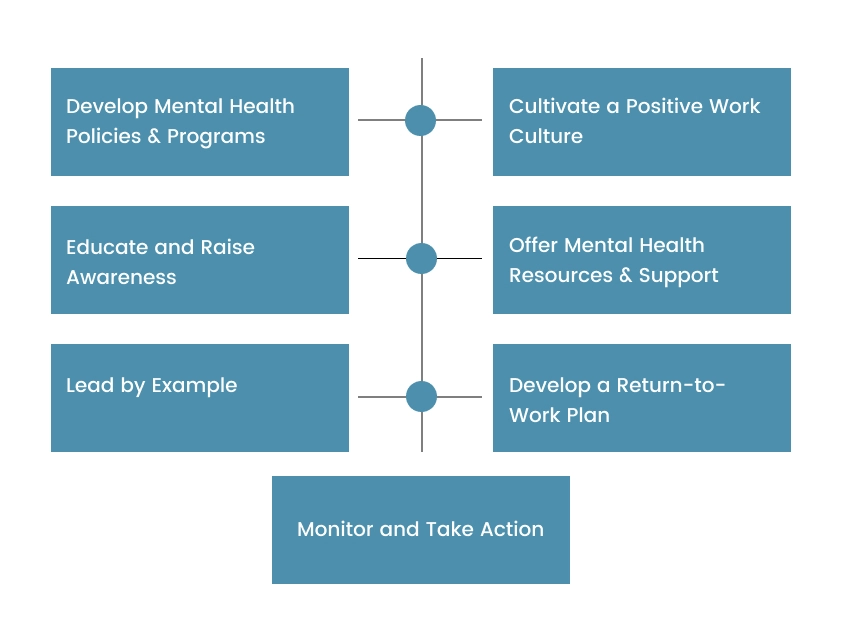
The importance of promoting mental health in the workplace has gained increasing attention in recent years, and with good reason. The World Health Organization predicts that by 2030, mental health disorders will surpass all other causes to become the leading source of disability worldwide.
This alarming statistic highlights the paramount importance of mental well-being in our lives. As awareness about mental health continues to grow, it becomes increasingly imperative for employers to recognize their pivotal role in fostering mental wellness within the workplace.
In this blog, we will look into the multifaceted responsibilities of employers in promoting mental well-being among employees, exploring strategies, policies, and practices that create a supportive work environment.
Why is Promoting Mental Health at Work Important?
The workplace is where we spend a significant portion of our waking hours. It is also a highly influential environment that can greatly impact an individual’s mental health. Employers have a vested interest in promoting mental wellness, as it directly correlates with employee productivity, job satisfaction, and retention rates.
When employees feel valued, supported, and motivated by their employers, they are more likely to perform at their best and contribute to a positive work culture. Furthermore, promoting mental health is not just beneficial for individual employees but also creates a healthier and more productive workforce as a whole.
According to the WHO, every dollar invested in mental health programs can result in a return of four dollars through improved employee health and productivity.
Promoting Mental Health at Work Important?
Promoting mental health is not just about addressing existing problems but also creating an environment that fosters prevention and resilience. It involves promoting positive work-life balance, reducing stress levels, promoting open communication, and providing necessary resources for employees to maintain good mental health.
Moreover, supporting employee’s mental well-being can also have a ripple effect on their personal lives, leading to better relationships with family and friends. Employers can play a crucial role in breaking the stigma surrounding mental health by addressing it openly and providing resources for support.
Work-Related Risk Factors that Can Harm Mental Health

Several factors related to work can contribute to poor mental health. Employers must be aware of these risk factors and take proactive measures to mitigate their impact on employees.
Workload: High job demands, long working hours, and tight deadlines can lead to excessive stress, anxiety, and burnout.
Lack of control: Employees who have little control over their work schedule, tasks, and decisions can feel overwhelmed and disengaged.
Poor work-life balance: When employees are expected to prioritize work over personal life, it can lead to feelings of guilt, fatigue, and burnout.
Lack of support: A lack of support from colleagues or management during challenging times can cause distress in employees.
Bullying and harassment: Workplace bullying, discrimination, or harassment can have severe detrimental effects on mental health.
How Do We Promote Mental Health in the Workplace?
Employers can adopt several strategies to promote mental health in the workplace, creating a positive and supportive work environment for their employees.

Develop Mental Health Policies & Programs
Employers should have clear policies in place that support mental well-being, such as flexible working hours, paid time off for self-care, and access to mental health resources.
They can also implement employee assistance programs (EAPs), which offer confidential counseling and support services.
Cultivate a Positive Work Culture
Employers should strive to create a culture that values open communication recognition of accomplishments, and encourages a healthy work-life balance. It is essential to promote supportive relationships among employees and between managers and their teams.
Educate and Raise Awareness
Employers can organize seminars, workshops, or training programs to educate employees about mental health, reduce stigma, and promote self-care strategies.
Offer Mental Health Resources & Support
Employers should provide access to resources such as mental health hotlines, online counseling services, and referrals to therapists or counselors.
Lead by Example
Employers can set an example for their employees by prioritizing their own mental health and well-being. They can also be open about their struggles with mental health and encourage others to do the same.
Develop a Return-to-Work Plan
Employers must have a return-to-work plan in place for employees who take a leave of absence due to mental health reasons, making sure they feel supported and accommodated upon their return.
Monitor and Take Action
Employers should regularly monitor the well-being of their employees and take proactive measures if any signs of distress or burnout are detected. This can include offering flexible work arrangements, reducing workload, or providing additional support.
Why should companies worry about mental health?
Mental health is a crucial aspect of overall well-being, and it directly influences an individual’s performance, productivity, and job satisfaction. Neglecting mental health in the workplace can lead to several negative consequences for both employees and employers.
- Reduced Productivity: Mental health issues can significantly impact an employee’s ability to perform at their best, leading to decreased productivity levels. This can result in lower output, missed deadlines, and increased errors.
- High Turnover Rates: Poor mental health often leads to job dissatisfaction, leading employees to seek employment elsewhere. High turnover rates can be costly for companies in terms of recruitment and training expenses.
- Increased Absenteeism: Mental health issues can also lead to frequent sick days or absenteeism due to burnout or other related issues.
- Negative Work Culture: Neglecting mental health can create a work culture where employees feel unsupported, leading to increased stress and tension in the workplace.
Therefore, it is essential for employers to prioritize mental health in the workplace as it directly impacts employee well-being and overall company success. By promoting mental wellness, employers can foster a healthier and more productive work environment.
Create an enabling environment for change
Promoting mental health in the workplace requires a shift in mindset and culture, which cannot be achieved overnight. Employers must create an enabling environment for change by involving all stakeholders, including management, employees, and any relevant third parties.
This can involve conducting surveys or focus groups to gather feedback from employees on their mental well-being and identifying areas of improvement. It is also crucial to foster open communication and transparency between all parties, allowing for constructive dialogue and collaboration.
Final Thoughts
Employers play a vital role in promoting mental wellness in the workplace. By addressing work-related risk factors, implementing supportive policies and programs, and fostering a positive work culture, employers can create an environment that prioritizes employee well-being. It is essential to recognize that investing in mental health not only benefits employees but also contributes to the success of the company as a whole. With proactive and holistic approaches from Excel Psychiatry, employers can create a workplace that promotes mental health and supports the overall well-being of their employees.
Therefore, it is crucial for companies to prioritize the mental health of their employees to foster a healthy work environment and ultimately drive success. Let us all work towards building a mentally healthy workplace!




